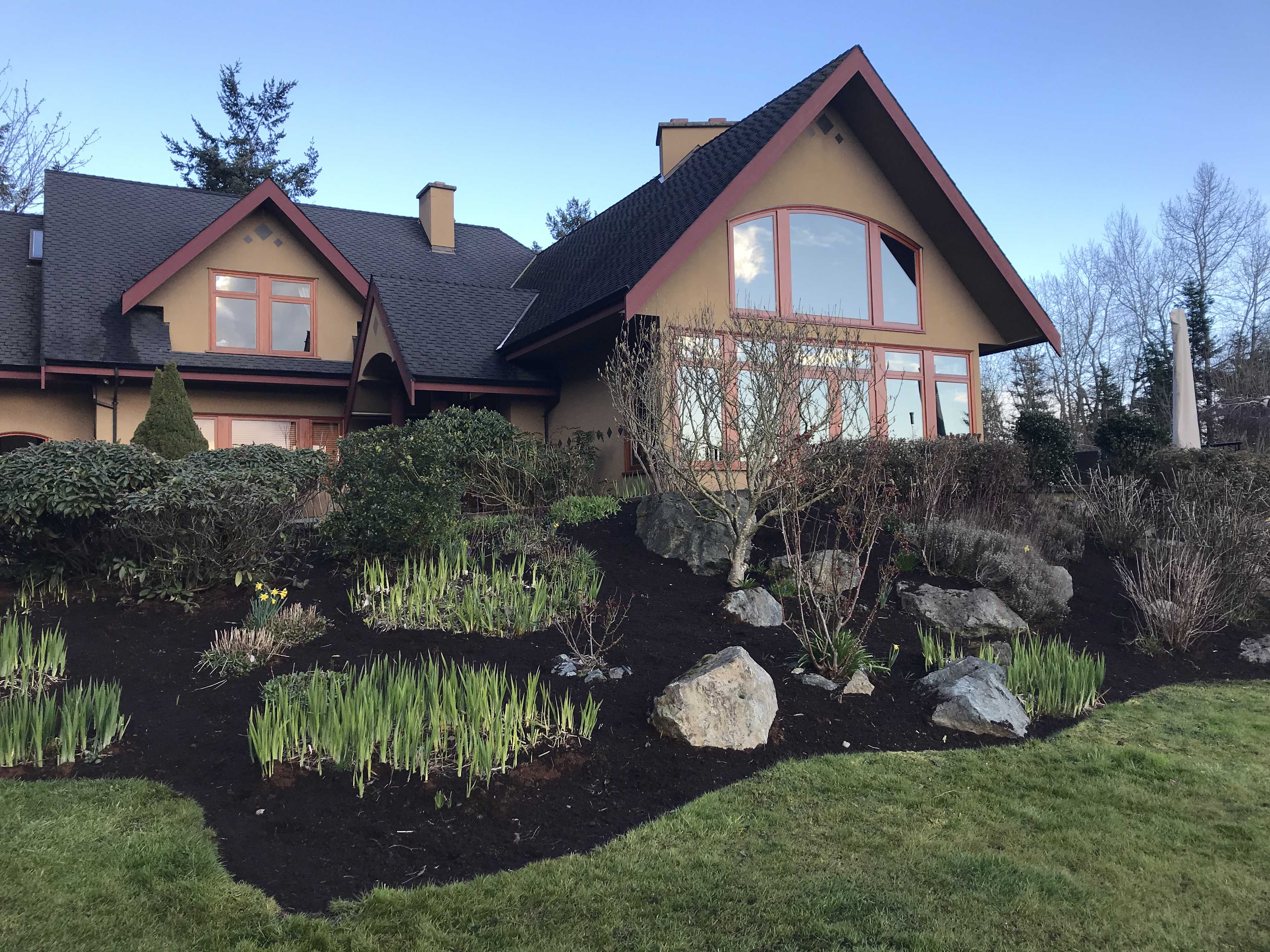The Benefits of Mulching for Healthy Gardens - Saanich, BC
.

Mulching is one of the simplest yet most effective ways to improve and maintain a healthy, vibrant garden. By applying a protective layer of organic or inorganic material on top of the soil, you can retain moisture, enrich the earth with nutrients, and keep weeds at bay—all of which are especially beneficial in the mild coastal climate of Saanich, BC. Below, we’ll explore the many advantages of mulching and how Ascent Yard Care can help you make the most of this practice.
1. Improved Soil Moisture Retention
Why It Matters
Saanich often experiences a Mediterranean-like climate: mild, wet winters and relatively dry summers. During drier spells, plants can quickly become stressed without adequate moisture. Mulch acts as a barrier, reducing evaporation and helping the soil retain water.
How Mulch Helps
- Less Frequent Watering: A mulched garden generally requires less irrigation, saving you both time and money.
- Healthier Roots: By keeping soil consistently moist, mulch supports strong, deeply rooted plants.
2. Weed Suppression
Why It Matters
Weeds not only look unsightly but also compete with your garden plants for nutrients, sunlight, and water. If left unchecked, weeds can choke out more delicate ornamentals or edibles.
How Mulch Helps
- Prevents Weed Germination: A thick layer of mulch obstructs the sunlight weed seeds need to sprout.
- Easier Weeding: Even if a few weeds manage to poke through, they’re simpler to remove when rooted in mulch rather than hard-packed soil.
3. Soil Temperature Regulation
Why It Matters
Temperature fluctuations—particularly during seasonal transitions—can stress plants. Roots fare best in stable conditions, and extreme heat or cold can slow growth and weaken plants.
How Mulch Helps
- Cooling in Summer: Mulch shields the soil from direct sunlight, keeping it cooler on hot days.
- Insulation in Winter: During colder months, mulch provides an insulating layer that helps prevent frost from penetrating too deeply into the soil.
4. Nutrient Enrichment
Why It Matters
Healthy, nutrient-rich soil is the cornerstone of a thriving garden. Plants need a balanced diet of nitrogen, phosphorus, potassium, and trace minerals to flourish.
How Mulch Helps
- Organic Mulches: Materials like wood chips, shredded leaves, or straw break down over time, gradually releasing nutrients back into the soil.
- Microbial Activity: As mulch decomposes, it fosters a beneficial environment for earthworms and microorganisms that aerate and enrich the soil.
5. Reduced Soil Erosion and Compaction
Why It Matters
Rainfall and irrigation can wash away topsoil—especially on sloped areas—leading to erosion and nutrient loss. Foot traffic or heavy machinery can also compact soil, preventing plant roots from accessing air and water.
How Mulch Helps
- Protective Barrier: Mulch softens the impact of rain, reducing runoff and keeping soil in place.
- Less Compaction: A cushioning layer of mulch underfoot helps prevent the ground from being overly compressed, preserving vital pore spaces in the soil.
6. Aesthetically Pleasing Garden Beds
Why It Matters
Beyond its practical benefits, mulch contributes to a tidy, cohesive look. A uniform layer of mulch highlights plants by contrasting their foliage and blooms against a neutral background.
How Mulch Helps
- Visual Continuity: Mulch ties various elements of your garden together, creating a polished appearance.
- Defining Pathways and Edges: Applying mulch along garden borders or paths helps clearly delineate different areas of your yard.
Types of Mulch to Consider
Organic Mulch
- Examples: Wood chips, shredded bark, compost, straw, leaf mold.
- Pros: Adds nutrients, improves soil structure, and fosters beneficial microorganisms.
- Cons: May require periodic replenishment as it decomposes.
Inorganic Mulch
- Examples: Gravel, landscape fabric, rubber mulch.
- Pros: Long-lasting, low maintenance, and often more resistant to wind and water erosion.
- Cons: Does not break down to enrich the soil, may retain heat in the summer months.
Common Mistakes to Avoid
- Applying Too Much Mulch: A layer of about 2–4 inches is generally sufficient. Excess mulch can suffocate plant roots or promote rot.
- Mulch Volcanoes: Piling mulch directly against trunks or stems can trap moisture and lead to decay. Leave a few inches of space around the base of the plant.
- Wrong Mulch for the Job: Some organic mulches (like fresh grass clippings or sawdust) can affect soil pH or become compacted. Research or consult a professional to choose the right type for your garden.
Why Choose Ascent Yard Care for Mulching?
- Local Expertise
We understand Saanich’s unique climate, soil conditions, and regional plants. Our team can recommend the best mulch types and application methods for your specific landscape. - Professional Application
From preparing your garden beds to applying mulch evenly at the correct depth, our experienced crew ensures every detail is handled properly. - Comprehensive Yard Care Services
Mulching is just one part of a healthy garden ecosystem. We also offer pruning, brush clearing, hedge trimming, and complete garden makeovers to keep your property looking its best. - Sustainable Practices
We focus on environmentally responsible solutions, from the materials we use to the way we handle yard waste. Whenever possible, we recycle or repurpose organic debris to minimize our ecological footprint.
Revitalize Your Garden with Mulch
Mulching isn’t just about appearances—it’s about preserving soil health, protecting your plants, and creating the ideal environment for growth. With proper materials and application, you’ll see a noticeable improvement in plant vigor, bloom quantity, and overall landscape aesthetics.
If you’re ready to experience the transformative benefits of mulching in your Saanich garden, Ascent Yard Care is here to help. Contact us today to discuss your yard care needs or schedule an appointment. Let us take the hassle out of garden maintenance so you can focus on enjoying your lush, thriving outdoor space.
